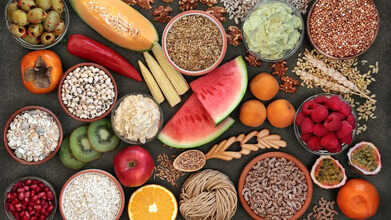- Health Conditions A-Z
- Health & Wellness
- Nutrition
- Fitness
- Health News
- Ayurveda
- Videos
- Medicine A-Z
- Parenting
- Web Stories
Boost Your Brainpower Every Morning With This Simple Meal

Image Credit: Canva
What you eat for breakfast in the morning determines how your brain is going to feel throughout the day. So, breakfast isn't just a fueling exercise for the body; it is an opportunity for cognitive function and mental clarity. Neurologists, nutritional psychiatrists, and brain health experts all recommend a single powerhouse meal: overnight oats topped with walnuts and blueberries. The easy-to-make breakfast provides a trifecta of brain-boosting benefits that combine antioxidants, omega-3 fatty acids, and sustained energy.
Let's understand why this simple breakfast is making waves in the brain health community and how it can help you stay sharp and focused.
Being the most energy-intensive organ in the body, the brain is of utmost importance; therefore, your dietary choice becomes what really matters. Foods high in antioxidants and healthy fats provide the brain with the fuel needed while also protecting it from oxidative stress and inflammation, the two major causes of cognitive decline.
Since breakfast is considered, by default, the most important meal of the day, this is particularly critical. Studies even contend that the right breakfast improves memory, concentration, and mood. Overnight oats with walnuts and blueberries certainly deliver these benefits in spades. Here's why:
1. Blueberries
Blueberries have a wealth of antioxidants, mainly anthocyanidins, which are flavonoids capable of crossing the blood-brain barrier to protect the hippocampus—the brain region responsible for learning and memory.
Research supports the brain-boosting power of blueberries. A 2012 study in the Annals of Neurology found that older adults who consumed blueberries and strawberries experienced a delay in cognitive aging by up to 2.5 years. These berries help combat oxidative stress caused by free radicals, unstable molecules that can damage cells and accelerate aging.
Blueberries are also part of the top three diets that experts recommend for brain health:
- Mediterranean Diet: This diet has been linked to lower risks of Alzheimer's and stroke due to its focus on fruits, vegetables, whole grains, and healthy fats.
- DASH Diet: It was originally developed to reduce blood pressure but is also beneficial for the brain because it reduces vascular damage.
- MIND Diet: A combination of the Mediterranean and DASH diets, it particularly emphasizes blueberries for their ability to slow down cognitive decline.
Add blueberries to your breakfast, a small step that can lead to significant long-term benefits for your brain health.
2. Walnuts
Walnuts have been called the "brain's superfood," due to high levels of ALA, which is an omega-3 fatty acid, and high levels of polyphenolic compounds. These have anti-inflammatory effects and can block oxidative stress - both of these factors contribute to cognitive decline.
A 2014 study in The Journal of Nutrition, Health & Aging found that walnut consumption improved cognitive test performance across all age groups. Although the study was funded by the California Walnut Council, its findings align with other research highlighting walnuts' neuroprotective effects.
Experts advise that an individual should take at least five handfuls of nuts per week. Walnuts are particularly noted for their vitamin E and higher antioxidant levels compared to all other nuts.
3. Oats
Contrary to sugary cereals or pastries, which are known for energy highs and crashes, oats release energy slowly, which helps stabilize blood sugar levels; thus, energy supply to the brain can be maintained.
A 2013 study in the European Journal of Clinical Nutrition showed that regular oat consumption reduced post-meal blood glucose levels and even contributed to modest weight loss. For brain health, this means fewer distractions from energy dips and more sustained focus throughout the day.
Oats also promote gut health by serving as a prebiotic, fostering a balanced microbiome. Emerging research suggests a strong gut-brain connection, meaning a healthy gut can enhance mood and cognitive function.
4. Heart Health Equals Brain Health
The heart and brain are close friends. Your heart pumps oxygen-rich blood to your brain. Damage to the blood vessels in any part of the body may impair cognitive functions. Diets such as the Mediterranean, DASH, and MIND diets have been proven to maintain vascular health, which prevents stroke and dementia.
Overnight oats topped with blueberries and walnuts contribute to heart health by lowering bad cholesterol, stabilizing blood pressure, and reducing inflammation.
Making the Perfect Overnight Oats
Crafting a brain-boosting breakfast is simpler than you might think. Follow this recipe for a nourishing start to your day:
- Combine ½ cup rolled oats with 1 cup of almond milk.
- Refrigerate overnight.
- Top with a handful of fresh blueberries and walnuts in the morning.
For it to be healthy, choose plain oats without added sugar. The natural sweetness of blueberries and the rich flavor of walnuts make added sweeteners unnecessary. For variety, consider adding other brain-friendly toppings like strawberries or almonds.
Why This Breakfast is Important?
With today's fast pace, it sometimes seems like eating a healthy breakfast is a hassle. Overnight oats offer a no-cook solution that aligns with busy lifestyles but delivers the very best brain health benefits. Combining antioxidant-rich blueberries, omega-3-packed walnuts, and energy-sustaining oats provides the brain with what it needs to flourish.
Start your mornings with this simple yet powerful breakfast, and you’ll not only feel sharper but also set the foundation for long-term cognitive health. Your brain—and your future self—will thank you.
Is The Viral Wellness Trend ‘Fibremaxxing’ Helping Or Harming Your Gut?

Credits: CANVA
Tiktok fibremaxxing wellness trend: There is no shortage of wellness trends online that claim to transform your health, but a new one has taken over social media with a focus on gut health. It’s called “fibremaxxing,” and its premise is simple: eat more fibre to improve digestion, metabolism, immunity, and lower the risk of disease. On TikTok and Instagram, the trend often appears as colourful lentil bowls, chia puddings, and smoothies loaded with leafy greens and flaxseeds. But how much of this viral trend is actually backed by science?
The idea of increasing both soluble and insoluble fibre isn’t new, yet fibremaxxing has made it trendy again—and this time, for good reason. Fibre is vital to everyday health, supporting everything from steady blood sugar to regular bowel movements. Here’s what experts say about this growing movement and why fibre truly matters.
What Is Fibremaxxing?
Fibremaxxing is a social media movement that encourages people to boost their fibre intake by adding more fruits, vegetables, legumes, and whole grains to every meal. The goal is to improve digestion, promote fullness, and support long-term health. According to Dr. Urvi Shah, a board-certified hematologist-oncologist and physician at Memorial Sloan Kettering Cancer Center, the concept behind fibremaxxing is largely rooted in scientific evidence. Dr. Shah, who is leading multiple studies on high-fibre plant-based diets, notes that the approach aligns well with established nutrition research.
Is ‘Fibremaxxing’ Good Or Bad For Your Gut?
High-fibre diets are consistently linked to a wide range of health benefits, from lowering the risk of heart disease, diabetes, and colon cancer to aiding weight control and gut function. That’s why Dr. Shah believes fibremaxxing gets several aspects right.
She explains that including a wide variety of plant-based, high-fibre foods is essential because “different fibre types feed different microbes.” A diverse diet helps nurture a balanced microbiome. She adds that the trend’s emphasis on whole foods rather than processed or fibre-enriched items is a major plus. “Whole plants provide fibre, polyphenols, and micronutrients that work together to support the gut,” she says. Prebiotic-rich foods also help shape a healthier microbiota and increase the production of beneficial short-chain fatty acids like butyrate, which has “anti-inflammatory and anti-cancer effects.”
Simply put, upping your fibre intake through natural, unprocessed foods, rather than supplements, can make a real difference to gut health.
What’s The Daily Recommended Amount of Fibre Intake?
Experts suggest that adults should consume between 25 and 30 grams of fibre each day. Men typically require more (around 38 grams), while women need about 25 grams. These numbers can vary depending on age, sex, and calorie intake, but a general guideline is 14 grams of fibre for every 1,000 calories eaten, according to Harvard Health.
How To Add Fibre To Your Diet?
Plant-based foods are the easiest way to increase your fibre intake, this could mean starting your morning with oats or simply adding more vegetables to your meals. Dietitian Laura Tilt notes that several everyday foods are surprisingly high in fibre:
- Rolled porridge oats – 4.5g per 50g (half cup)
- Canned chickpeas – 7g per half can
- Seeded bread – 5g per two slices
- Canned lentils – 6g per half can
- Frozen peas – 4.5g per 80g (3 tbsp)
- Frozen raspberries – 5.5g per 80g (3 tbsp)
- Wholemeal pasta – 6.5g per 75g serving
- Dried apricots – 3g per 3–4 pieces
- Reduced salt/sugar baked beans – 7.5g per half can
- Mixed milled seeds (flax, pumpkin, chia) – 4.5g per 25g
Is Fibremaxxing Helpful?
There’s no doubt fibre plays an essential role in maintaining good health. But like any nutrient, too much of it can cause problems if not balanced properly. A sudden surge in fibre intake without enough water can lead to bloating, gas, constipation, dehydration, or even trigger IBS symptoms. Over-focusing on fibre might also cause you to overlook other nutrients your body needs. The key is moderation, fibre is beneficial, but it works best as part of a balanced, varied diet.
Why Cant I Digest Milk, But Can Easily Eat Yogurt?

Credits: Canva
If you landed here, the reason is that you are also someone who cannot tolerate milk, but loves yogurt, and are probably wondering why is that?
The logic is that if you have lactose intolerance, you won't be able to digest any dairy product, but with yogurt, your life is easy. The answer lies in the components of the two various dairy products that come from the same source.
Why Can't You Digest Milk?
The reason is because you are lactose intolerant. This is a condition that makes it hard to digest the sugar in milk and milk products, called lactose. People with lactose intolerance could have diarrhea, gas and bloating after they consume milk. While this condition is usually harmless, it can cause discomfort.
This happens because the enzymes in the small intestine, called lactase is responsible for lactose intolerance. If someone has too low levels of lactase, the person can become lactose intolerant.
The small intestine and colon are parts of the digestive tract, which processes the foods you eat. The intestine pull out nutrients from the food and whatever is not absorbed by the intestines continues along the digestive tract and is expelled as stool during a bowel movement.
But Why Can You Digest Yogurt, If You Cannot Digest Milk?
The answer to this lies in the fermentation process that turns milk into curd and breaks down much of the lactose, which is the sugar, that is often difficult to digest. The probiotic bacteria used to make curd contain their own lactase, which helps in the breakdown of lactose, and this can further help with digestion even for those who do not produce enough lactase on their own.
Furthermore, during fermentation, the bacteria in curd, called the Lactobacillus bulgaricus and Streptococcus thermophilus convert lactose into lactic acid, which is easier for the body to process. This helps your body to digest curd easily over milk. Since the bacteria contains lactase, which the milk lacks, some people may find it easier to digest curd or yogurt over milk.
The bacterial cells also physically protect their lactase, and it can work to break down the lactose from the curd as it passes through the digestive system.
Why Is Curd Gut-Friendly?
The key to a healthy gut health is lactobacillus, a kind of probiotic, which helps in digestion, suppression of disease-causing bacteria and treats constipation. It also is beneficial in treating irritable bowel syndrome. It breaks down sugar into lactic acid.
A study by a Bhubaneswar-based professor Balamurugan Ramdas also revealed that Bengal or Odisha's popular breakfast Panta Bhaat, which includes fermented cooked rice, also releases the same bacteria, that fermented milk releases and so it contains short-chain fatty acids, which are responsible for improving gut health and boosting immunity.
Furthermore, curd is known to balance the gut flora, probiotics improve digestion, and the absorption of nutrition. They also help in the breakdown of food, reducing issues like bloating, gas, and constipation. The probiotics in curd can help restore the natural balance in your gut, which can soothe an upset stomach and alleviate discomfort from indigestion. A healthy gut is closely linked to a strong immune system, and the probiotics in curd help to boost gut health, which in turn can enhance immunity.
Sourdough vs Regular Bread: Which One Is Actually Better For Your Gut?

Credits: Canva
Bread is a staple across most diets, but not all loaves are made the same. In recent years, sourdough has gained a reputation for being the “healthier” bread—praised for its tangy flavour, natural fermentation, and supposed benefits for digestion. But how much of this is true? Here’s what experts and studies reveal about how sourdough compares to regular bread in terms of health and nutrition.
What Makes Sourdough Different
Unlike most commercial breads that rely on baker’s yeast for quick rising, sourdough is made using a natural starter—a mixture of flour and water that ferments over several days. This starter contains wild yeast and lactic acid bacteria, which break down carbohydrates and gluten during fermentation.
According to the Harvard T.H. Chan School of Public Health, this slow fermentation process increases the bioavailability of nutrients like folate and magnesium while producing organic acids that give sourdough its characteristic tang. In contrast, regular white or whole wheat bread undergoes a much faster process, often with added yeast, sugar, and preservatives to speed up production.
Easier on Digestion
One of sourdough’s biggest advantages lies in how it affects the gut. The fermentation process partially breaks down gluten, making it easier for some people to digest compared to conventional bread.
A 2021 review published in the journal Food Microbiology found that lactic acid bacteria in sourdough can help reduce compounds called FODMAPs—a group of carbohydrates known to trigger bloating and discomfort in people with irritable bowel syndrome (IBS). This makes sourdough a potentially gentler option for sensitive stomachs, though it’s not suitable for those with celiac disease.
Better Blood Sugar Control
Another reason nutritionists often recommend sourdough is its effect on blood sugar levels. The acids produced during fermentation slow down the rate at which glucose is released into the bloodstream.
Research published in the Journal of Cereal Science noted that sourdough bread has a lower glycemic index (GI) than regular white or whole wheat bread. This means it causes a slower, more stable rise in blood sugar, something especially beneficial for people with diabetes or insulin resistance.
Nutrient Profile and Shelf Life
While both sourdough and regular bread contain similar calories and macronutrients, sourdough tends to have slightly higher levels of antioxidants and minerals because of the fermentation process. It also naturally resists mould growth, allowing it to stay fresh longer without artificial preservatives.
As per Cleveland Clinic dietitians, choosing whole-grain sourdough offers the best nutritional value, combining the fibre of whole wheat with the gut-friendly benefits of fermentation. On the other hand, refined white breads offer little fibre and are often fortified artificially.
The Bottom Line
Sourdough is not a miracle food, but it does stand out as a healthier and more digestible alternative to most commercial breads. Its fermentation process not only enhances flavour and texture but also supports gut health and stable blood sugar levels.
If you enjoy bread and want to make a more wholesome choice, opt for an artisanal or homemade sourdough made with whole grains and minimal additives. As nutrition experts often say, the real key is balance, pair your bread with fibre, protein, and healthy fats for a meal your gut (and taste buds) will thank you for.
© 2024 Bennett, Coleman & Company Limited

